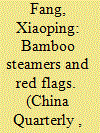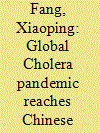|
|
|
Sort Order |
|
|
|
Items / Page
|
|
|
|
|
|
|
| Srl | Item |
| 1 |
ID:
153351


|
|
|
|
|
| Summary/Abstract |
This paper explores how the new Communist government developed a political consciousness of discipline and collegiality among traditional rural midwives in Chinese villages during the 1950s. It argues that selected traditional rural midwives were taught to observe discipline by attending meetings and studying, and to develop collegiality with peers through criticism and self-criticism of their birth attendance techniques and personal characters in short training courses from 1951 onwards. A legitimized midwife identity gradually formed in rural communities, but with it came conflicts and rivalry. By keeping these midwives under institutional surveillance and creating a dynamic and constant moulding process, the new government intended to foster professional and political discipline and collegiality within the group based on a normativized notion of selflessness performed within a changing series of indoctrination schemes that demonstrated continuity and complementarity and which I have described as common, preliminary, institutionalized, and dynamic schemes. This article examines how the state attempted to retrain marginalized and derided midwives with appropriate class backgrounds in order to incorporate them into the modern medical world, then still dominated by doctors and nurses with suspect class backgrounds. Ironically, in creating “socialist new people” to intervene in traditional rural birthing practices and introducing fee-for-service professionalism, the CCP accidentally created a degree of petit-capitalist thinking among women whose traditional mode of work may have been more selfless, thus complicating the process of indoctrinating selfless dedication.
|
|
|
|
|
|
|
|
|
|
|
|
|
|
|
|
| 2 |
ID:
131807


|
|
|
|
|
| Publication |
2014.
|
| Summary/Abstract |
In 1961 the seventh global cholera pandemic, El Tor cholera, broke out in Indonesia. Between 1962 and 1964, El Tor infected the southeast coastal areas of China. This pandemic occurred at a time of significant reorganization for both the rural medical and health systems and the people's communes following the failures of the Great Leap Forward. This paper explores how local governments led rural medical practitioners, health care workers, and villagers to participate in the campaign against the spread of El Tor cholera despite the readjustment and retrenchment of the people's communes as social, administrative, and political units. I argue that, during this period of flux, the local government strengthened its control over rural medical practitioners by institutionalizing their daily work practices and reducing their freedom of movement, whilst simultaneously providing incentives for health care workers to join the vaccination campaign. The people's communes and the household-registration system after 1961 put further restrictions on population mobility. This cellularization of village society greatly facilitated the vaccination, quarantine, and epidemic-reporting processes, and contributed to the formation of an epidemic-prevention system and eventually a response scheme for managing public health emergencies in rural China. This process reflected the complexity of the mutual interactions between the political and medical systems under socialism.
|
|
|
|
|
|
|
|
|
|
|
|
|
|
|
|
|
|
|
|
|